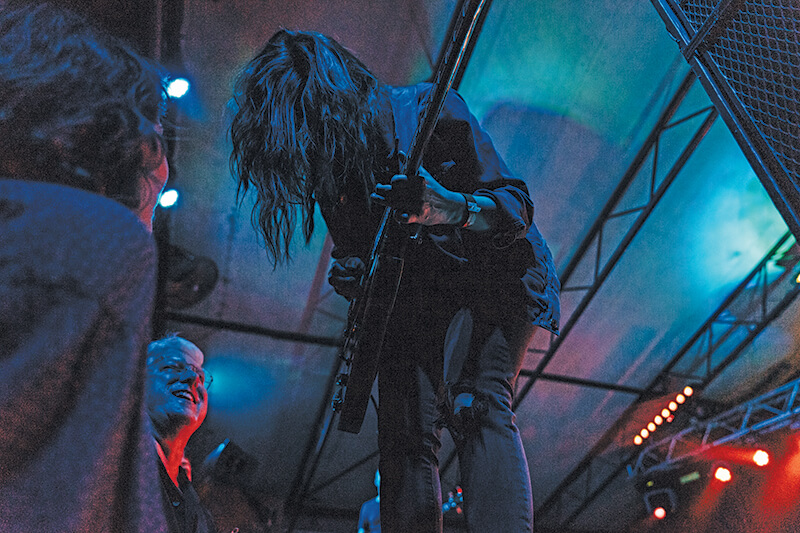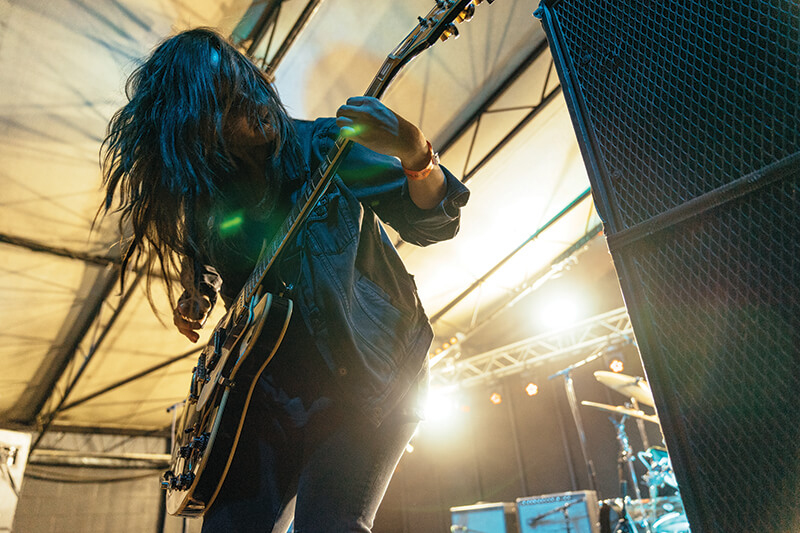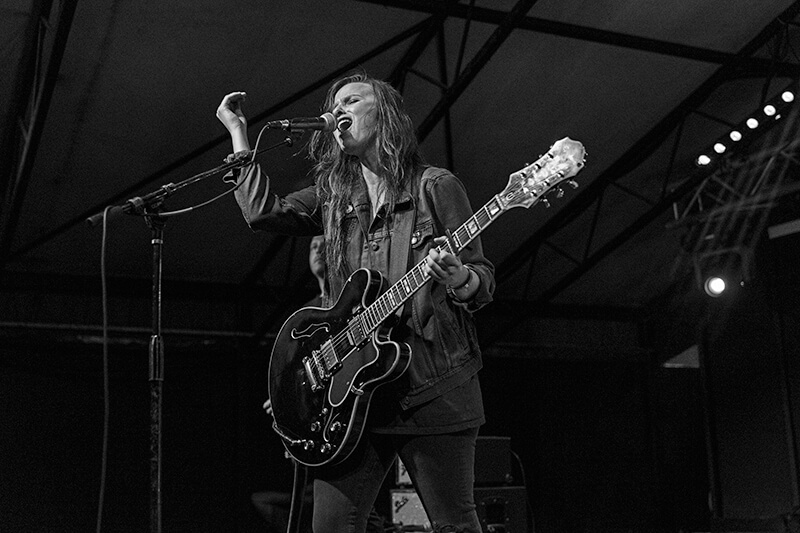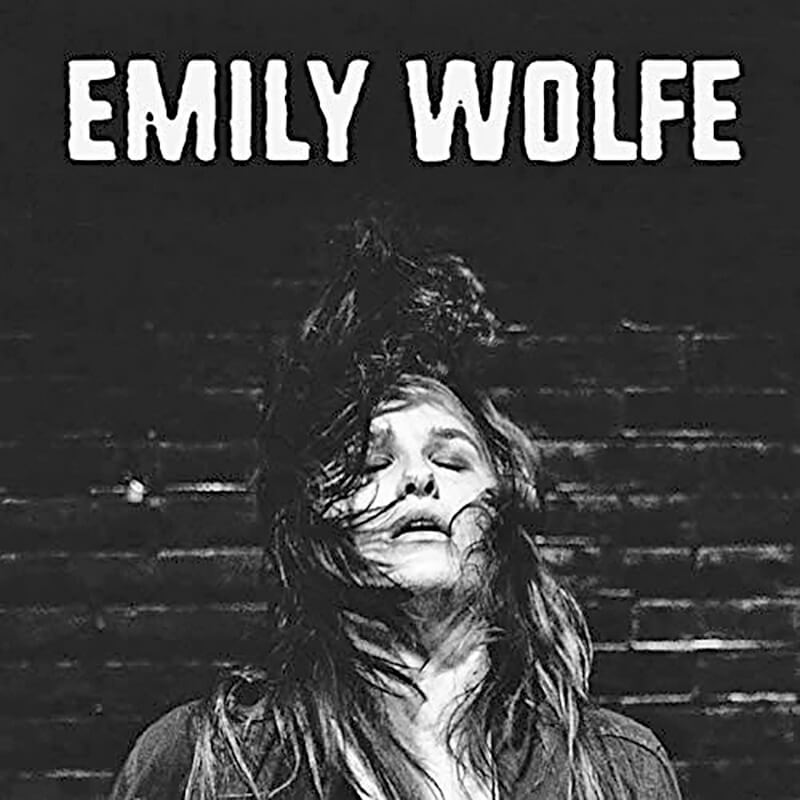Bad-Ass. Boss. Empowerhouse.
Emily Wolfe took my call from her car.
The sun was setting on Austin, TX and she was just getting home. She was parked in the driveway of the house in the suburbs that she shares with her wife, Brittany.
She laughed as she explained to me that from her vantage point in the car, she could see one of her dogs staring out of the house’s front windows, while Brittany was probably trying to wrap up work and unwind.
It’s a quaint scene, from a domestic kind of life. Not necessarily what you’d expect from someone who has been receiving increasing recognition for their art as a rockstar.
At 29, Wolfe has spent the better part of the last decade – sometimes deliberately, sometimes unknowingly – building towards this life. Today, she’s sober, supported, and well on her way to success as a songwriting, bluesy badass with prodigy-level guitar skills. However, it’s taken peaks, valleys, self-discovery, and a lot of work to get here.
Emily has been playing since she was five years old. Her first guitar – an acoustic 6-string – came from some “weirdo thrift shop” where she just remembers seeing it hanging on a wall, and not being able to look away. It was love at first sight.
She started guitar lessons with an older man in town, which she hated because he told her she’d never be good at it and should probably just learn drums instead.
She begrudgingly tells me that drums are actually her first instrument. But it didn’t take long for her to find her way back to that six-string.
As a kid, her family relocated from Charlotte, NC to Texas, which she says was a driving force in her picking up guitar for good. “I didn’t have friends in this new state,” she says.

“I grew up in church, which is an unfortunate thing for me as a gay woman, but you know…” Emily recalls. “I would get to watch a band play and run home and try to recreate the stuff on guitar. And it was kind of an everyday thing.”
Feeling out-of-place at church because of who she was, feeling out-of-place at school because she was new, and trying to do the self-discovery that is inevitable in your early teen years sounds near impossible. But, she says that found solace and purpose in guitar, and being in Austin was her best-case-scenario.
“I wouldn’t want to live anywhere else. Austin is where I found my sound, and grew up and became a real human,” she laughs.
That real human released her self-titled, full-length album in February of this year. Produced by Ben Tanner, keyboardist for Alabama Shakes, and written entirely by Wolfe, this record is her most important work to date.
The first time I listened to it, I was walking home from work. I tend to dedicate my downtime to telling stories; this album made me remember why.
The first song on the record is called “Violent Veins.” It opens with a rhythmic kick drum that puts you in a trance, while Wolfe skillfully builds up the guitar riff to a climax, bringing the rest of the band in. By the time her voice cuts through the noise, you simultaneously feel hungry for, and are totally surprised by it. It’s delicate but edgy — full, and emotional.

The lyrics are that of a woman who is loving, losing, learning, and becoming.
“Come on baby just lend me your soul, I can’t run around forever just searching for my own / I think I broke your body and stretched out your lungs / I can’t breathe without your love,” she howls.
It feels like something – punk and bluesy, pop with more edge, hardcore with a bow. It feels like Peggy Olson Rock.
Now, for those of you who are like ‘Who the hell is Peggy Olson, and what is she doing here?’ — let me tell you. Peggy is an integral character on the AMC show Mad Men. Played by Elisabeth Moss for all seven seasons, she starts out as this unassuming secretary, who by the end of the show has been through some shit, dealt with it, and is a woman in her power taking her earned seat at the table. The scene with her carrying her stuff to her new office, cigarette hanging out of her mouth, don’t-fuck-with-me attitude just dripping from her whole person – that is what Emily’s music is. And honestly, Peggy and Emily aren’t so different.
Emily is a woman who is coming into her own, too.

“That’s totally a deal with being a woman, like you’re supposed to be dainty and not take up space and not sweat and stuff,” Emily says. “But I don’t know, I’ve gotten to the point where I’m like ‘I don’t fucking care’. I’m not going to cross my legs when I’m sitting. I’m going to just talk the way I talk. Whatever.”
She’s being her, and she’s surrounding herself with the people that support that vision.
“For so long, I would sit down with a person – whether it be a manager or a booking agent or whoever – and I would feel as if they were interviewing me for a position that they had open. It would be such a reversed thing. Now, there’s a total role reversal. Now, I interview people to be like ‘hey do you want to work with me’ instead of me being like ‘do you think I’d be a good fit on your label?’”
She says it’s established a much healthier environment for her to create in, and she couldn’t love her team more. Her manager, Brittany Durdin, is also her wife. Her bandmates, Clellan Hyatt and Evan Nicholson are guys who she now says are like brothers. And Emily is making the art that feels like, well, Emily. Whatever that is.
“I’ve always wanted to be a pioneer on the frontlines of something musical,” she says. “If it’s my album, that’s awesome. If it’s something in music, that’s great too. But I’ve always wanted to be the first person to break through some kind of genre barrier.”
That’s why working with Ben was such a treat. He was able to shed light on that piece of magic that is unique to Emily – she knows what she wants to hear, in a world where not everyone knows what they want to hear – and was able to pull it out.

She was deliberate with every piece of pre- and post-production on the new LP. She taught herself a lot before Ben even got involved, but through that relationship, was able to learn interesting tricks for capturing the right sound.
“I learned a really cool-ass trick, which is: putting a mic under a drum set that’s kinda shitty and blending it into the regular drum track makes a really cool sound,” she says excitedly.
The hardest part, she says, was the sequencing of the album tracks. She asked for input from close friends and family, and had about five different versions of the tracklist before sitting down and listening to each song again. She said the version on the album was decided because she wanted to “take people on a roller coaster but don’t surprise them too much.”
That mindset of knowing where the boundaries are, while relentlessly pushing at them, seems to work well for Emily. She even applies it when she’s on the road. As a gay woman, lead guitarist, from a relatively liberal hometown, it would be easy to understand if she shied away from visiting some more conservative locales. Instead, Emily says, she just plans ahead.
“I definitely plan my set – what I play – around what the audience is going to be like. So, for example, I played Little Rock, Arkansas, and I had never been there before. I was like, ‘Oh my God, what is this going to be like?’ So based on the demographic, I pulled out some classic rock covers. I played the normal heavier stuff of mine, and at the end I was like ‘I’m just going to blast them with ‘Hot for Teacher’ and ‘Ace of Spades,’ and they loved it! If you can just nail some stuff that they love, they’ll drop preconceived notions about me.”
So that’s what’s up next. Emily is taking her guitar, her band, and her genre-bending musicality on tour. She’ll be pushing the limits on the road through 2020, just trying to get loud, connect, and be heard.
“That’s a super cool thing about music, when you can connect with somebody on that level, stuff can melt away…”
**photos by Whitney Hensley
